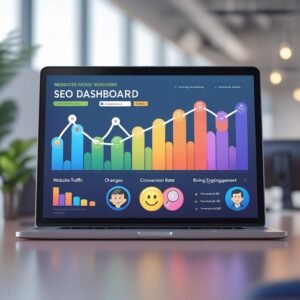Artificial Intelligence (AI) is no longer a futuristic concept—it’s a game-changer in the marketing world. From automating repetitive tasks to providing deep consumer insights, AI is transforming how businesses engage with their audiences. Companies that leverage AI effectively gain a competitive edge, while those that ignore it risk falling behind. This blog explores the rise of AI in marketing, its impact on businesses, and actionable strategies to stay ahead in this rapidly evolving landscape.
How AI is Reshaping Marketing
AI is revolutionizing marketing by enabling businesses to make data-driven decisions, personalize customer experiences, and optimize campaigns in real time. Here’s how:
1. Hyper-Personalization
AI analyzes customer data to deliver highly targeted content and recommendations.
Example: Netflix and Amazon use AI-driven algorithms to suggest content and products based on user behavior.
2. Automated Content Creation
AI-powered tools like ChatGPT and Jasper generate high-quality content, saving time and resources.
Brands use AI to create blog posts, social media captions, and email campaigns tailored to audience preferences.
3. Predictive Analytics
AI helps businesses forecast trends, customer behavior, and buying patterns.
Example: Retailers use AI to predict which products will be in demand, optimizing inventory management.
4. Chatbots & Conversational AI
AI-powered chatbots provide instant customer support, improving engagement and response times.
Example: Brands like Sephora and H&M use chatbots to assist customers in making purchase decisions.
5. AI-Driven Advertising
AI optimizes ad targeting by analyzing user behavior, demographics, and past interactions.
Platforms like Google Ads and Facebook Ads use AI to ensure businesses reach the right audience at the right time.
6. Voice & Visual Search Optimization
AI enhances voice search (e.g., Siri, Alexa) and visual search (e.g., Google Lens) capabilities.
Businesses must optimize content for AI-driven searches to maintain visibility in search engine results.
Challenges Businesses Face with AI in Marketing
While AI offers immense potential, businesses must overcome certain challenges to maximize its benefits:
1. Data Privacy & Compliance:
With regulations like GDPR and CCPA, companies must ensure AI-driven marketing complies with data protection laws.
2. Integration with Existing Systems:
Implementing AI requires seamless integration with current marketing tools and platforms.
3. Skill Gaps:
Businesses need skilled professionals to interpret AI insights and make strategic decisions.
4. Dependence on Quality Data:
AI’s effectiveness depends on accurate and comprehensive data; poor data quality leads to unreliable predictions.
How Businesses Can Stay Ahead
To remain competitive in the AI-driven marketing landscape, businesses should:
1. Skill Gaps:
2. Invest in AI-driven CRM systems, marketing automation platforms, and analytics tools.
3. Utilize AI-powered SEO tools to improve content visibility and ranking.
4. Leverage First-Party Data.
5. With increasing data privacy concerns, businesses should collect and utilize their own customer data to drive AI insights.
6. Continuously Optimize AI Strategies.
7. Regularly test and refine AI-driven campaigns to enhance performance and ROI.
8. Invest in AI Training & Talent.
9. Equip teams with AI knowledge and hire experts to manage AI-driven marketing initiatives.
9. Balance AI with Human Creativity.
10. While AI enhances efficiency, human creativity and emotional intelligence remain irreplaceable in crafting compelling brand narratives.
Conclusion
AI is not just a trend—it’s the future of marketing. Businesses that embrace AI-driven strategies will stay ahead of the curve, enhance customer experiences, and drive growth. As AI continues to evolve, companies must adapt, innovate, and strike the perfect balance between automation and human creativity.
Ready to integrate AI into your marketing strategy? EncoderLabs can help you navigate the AI revolution with cutting-edge solutions. Contact us today!




